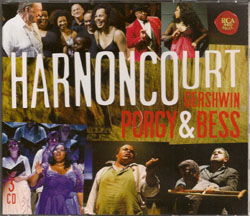
CD Review:
PORGY AND BESS
(Opera in three acts)
music by George Gershwin
libretto by DuBose Heyward
lyrics by DuBose Heyward and Ira Gershwin
Performers:
Isabelle Kabatu, Soprano (Bess)
Angela Renee Simpson, Soprano (Serena)
Bibiana Nwobilo, Soprano (Clara)
Roberta Alexander, Soprano (Maria)
Jonathan Lemalu, Bass-Baritone (Porgy)
Gregg Baker, Baritone (Crown)
Rodney Clarke, Baritone (Jake)
Michael Forest, Tenor (Sportin' Life)
Previn Moore, Tenor (Mingo, Robbins, Peter, Honey-Man, Crab-Man)
Children's Choir
Arnold Schoenberg Chor, Erwin Ortner, chorus master
Chamber Orchestra of Europe,
Nikolaus Harnoncourt, conductorRecorded at the Styriarte Festival, 29 June; 1, 3, 5 and 7 July 2009,
Helmut-List-Halle, Graz, Austria .
Recorded and mixed by Teldex Studio, Berlin.
3 CD box set
Disc One = 71:30
Disc Two = 63:18
Disc Three = 41:03RCA Red Seal/ Sony Music 86697591762
Rating: ***
During the 78 RPM and LP era, you would have a hard time finding any complete performance of Gershwin's masterpiece, PORGY AND BESS, now generally considered as the greatest American opera of the 20th century.
Even today, there are more recordings available of best known arias from this opera, such as "Summertime" and "I Got Plenty O' Nuttin."
Yet within the past fifty years or so, there have been at least four major recordings of PORGY AND BESS:
Columbia - conducted by Lehman Engel --first nearly complete version, originally on 1951 LP.
Decca - conducted by Lorin Maazel (1976) -- first stereo release of complete opera.
RCA Red Seal - Houston Grand Opera (1990) -- another highly regarded stereo recording.
EMI Classics - conducted by Simon Rattle (1991) -- highly praised production from the UK.
There are several single disc highlights albums which have less than ideal sound quality but are still worth having for the stellar singing:Decca (from 1940 LP version with members of the original 1935 cast)
RCA (from 1963 LP with Leontyne Price and William Warfield)
Well, how does this new set conducted by Nickolaus Harnoncourt compare with the other complete versions?
First, the recording sound is not very good, like it was recorded from the last row of an opera house. The fact that it was recorded at a music festival in Austria over several days does not excuse this less than ideal sound balance. It would have been better to record it a studio where better sound balance could be achieved.
There are also diction problems with some of the singing not clearly enunciated, especially in the ensemble numbers. Perhaps that's because much of the cast is South African and not American. That's not meant to be prejudicial. American singers have more directness and ease with this music by Gershwin. He was, after all, perhaps the best of all American songwriters of the 20th century. His PORGY AND BESS may strive to be a 'folk opera' but it has many popular song elements, especially in the arias, which are usually handled better by American singers.
The opening Introduction for orchestra seems a bit tentative and not quite rhythmic enough. The famous opening "Summertime" aria, sung by Bibiana Nwobilo, is good though her diction could be better.
Then there is the question of the two main characters: Porgy (Jonathan Lemalu) and Bess (Isabelle Kabtu). For example, their big duet in Act Two, Scene 1: "Bess, you is my woman now" (CD 2, track 3) which just doesn't come alive and sounds far too stiff and swoopy. The American idioms are lost on these two singers. I still get chills listening to Todd Duncan and Anne Brown from the original cast on the Decca CD (recorded in 1940), and especially with George Gershwin himself conducting a rehearsal in 1935, available on an old Musical Heritage Society 1991 CD ("Gershwin Performs Gershwin") now unfortunately hard to find. I believe the singing by Todd Duncan and Anne Brown have never been equaled or surpassed and the singing on this new CD set is not even close, and that includes the Arnold Schoenberg Choir, who aren't flexible enough in their singing.
The large booklet that comes with the CD set is filled with lots of information, including an interview with Nikolaus Harnoncourt ("This is 'world music', music of universal relevance") and his detailed discussion of the opera ("An American 'folk' opera - an American Wozzeck"), Notes on Porgy and Bess by Josef Beheimb, Synopsis of the opera, and the complete text in English and German. Harnoncourt's observations are good ones but sometimes overly fussy. He has made some alterations to this opera. He writes: "The cuts we have made are intended to make our own version of the work much clearer." Then he ends with this comment: "The work speaks for itself." Why not let us hear ALL the music that George Gershwin composed? The cut sections could have been included as bonus tracks? Then listeners can decide if we agree or disagree with Harnoncourt's cuts.
Overall, as I have said, this is a version that is vocally and technically inferior to previous recordings.
As it stands, it is merely a good attempt by a respected German conductor who has admired this work for a long time. But why does this opera have to be tampered with when the same thing probably wouldn't be allowed for Puccini's LA BOHEME or Verdi's AIDA?
Among all the complete versions, I would select the ones led by Lorin Maazel or the Houston Grand Opera recording as the best choices, or better yet if you can find a copy, the 1935 rehearsal led by Gershwin himself. Listening to them, as Harnoncourt wrote, this greatest of American operas -- "speaks for itself."
--Roger Hall, 18 November 2010
Please help support the mission of this website
Order your copy of this limited edition CD
Home page: American Classical Composers
© 2010 PineTree Productions. All Rights Reserved for original material on this site.







